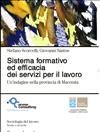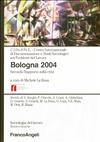
LIBRI DI MICHELE LA ROSA
La ricerca ha estratto dal catalogo 217 titoli



cod. 1529.100

Lavoro, consumo e luoghi sociali
cod. 1529.99

Letture e documenti
cod. 1529.2.88

Una ricerca empirica su studenti e innovazione nei percorsi di studio
cod. 1520.511

cod. 1529.2.87

Secondo Rapporto sulla città
cod. 1529.2.86

cod. 1529.98

Temi e applicazioni
cod. 1529.2.85

cod. 1529.97

Mestieri, competenze e fabbisogni formativi
cod. 1529.2.84

Secondo rapporto sulla popolazione giovanile nella provincia di Bologna
cod. 1529.2.83

cod. 1820.99

Cos'è, perché e come intervenire
cod. 1529.2.72

cod. 1529.2.68

Il ritorno dell'etica ABSTRACT:The return of Ethics The article tries to explain the current return of ethics’ issues in general, and of enterprises’ ethics more in particular. It explores motives and reasons of such a return, but defines as well the conditions through which this return shouldn’t be reduced to a mere formal ritual and superficial vogue.



The work quality of graduates. Survey taken one and three years after graduation This essay analyses the quality (in sociological terms) of work performed by university graduates one and three years after graduation. In addition to a concise theoretical and interpretive overview on consolidated approaches of sociology and of sustained paradigms regarding transformations in labour and its organisation at a productive level, the results of the AlmaLaurea study are outlined according to a series of factors: work contracts; earning expectations; career expectations; expectations of acquisition of professionalism; autonomy at and in the job; and free time. The results are also evaluated in light of the effectiveness of skills acquired at the university. Lastly, the points of reference which emerge as a consequence are compared to the aforementioned theoretical and interpretive considerations in order to extract elements which can be generalised and thus arrive at a more thorough understanding of the topic.